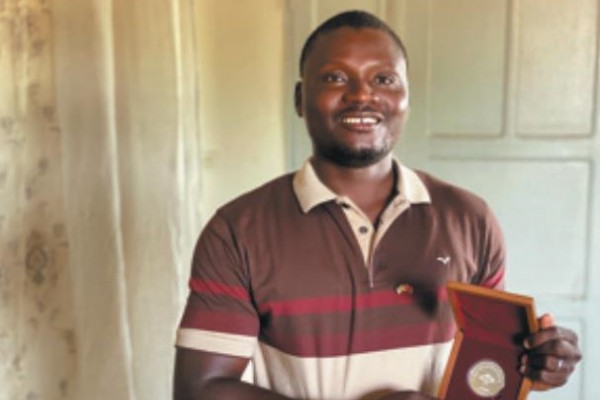
Leon Kossivi
In the past 10 years, Leon Kossivi from Togo has participated in and contributed to the Belt and Road Initiative, as well as benefited from it.
While in university, Kossivi majored in sociology. In 2009, the Confucius Institute was established in his alma mater, the University of Lome, and he became one of the first students to learn the Chinese language at the institution.
"By learning the Chinese language, I began to know more about the country and its culture and I hoped to have a chance to visit China one day," he said.
Thanks to his fluency in Mandarin, Kossivi got a job offer as an interpreter for China Road and Bridge Corporation, or CRBC, which is dedicated to improving infrastructure construction in African countries.
"Every day, I spent 24 hours with my Chinese colleagues, and we became close friends. At work, I asked questions when I didn't understand and learned what I didn't know," he recalled.
At the time, Kossivi was working for the Lome Ring Road Project, which is 34.8 kilometers in length with four lanes in two directions, covering the eastern and northern areas of Togo's capital Lome.
"There was a training program in our project, and some skilled Chinese workers taught me how to drive excavators, repair machines and undertake engineering surveys. They said they would teach me everything as long as I am willing to learn," he said of the experience.
In the following years, Kossivi worked on different infrastructure construction projects and he grew from an ordinary interpreter to a senior project engineer, which he said has taught him a lot.
'Example of benefits'
"I am a good example of the benefits the Belt and Road Initiative has brought to Africans," Kossivi said. "Most young African workers only had senior high school diplomas when they came to the company. With the help of senior skillful Chinese workers, they gradually acquired professional expertise, and some of them chose to go back to school for further studies. Therefore, the BRI has changed their lives," he said.
The initiative, proposed by China in 2013, aims to boost interconnectivity and strengthen partnerships among countries, and enhance people-to-people exchanges.
Currently, Kossivi is a manager assistant of the CRBC's Dakar Bus Rapid Transit project in Senegal, the first electrified bus rapid transit system in sub-Saharan Africa, which connects the coastal city of Guediawaye with Dakar. It has a total length of 18.3 km and 23 stations.
After the completion of the project, the travel time between the two places will be reduced from 90 minutes to 45 minutes with an average capacity of 300,000 passengers per day.
In 2016, as an alumnus of the university's Confucius Institute, the young man was invited to join a 40-day summer camp in China, during which he visited Chongqing and Chengdu, the cities in the country's southwest. "During my visit to China, I was amazed by the advanced technologies, convenient urban lifestyle, and modern transportation infrastructure. I wish my home country and the African continent can be as modernized as China," he said.
During his work, he also met his future wife, who got a job as a toll collector in Keur Madaro in Senegal. The couple have two children and also own a house.
Talking about the future, the engineer was positive about the China-Africa collaboration.
"Over the past 10 years, I have become a senior member of the CRBC.In the next decade, I want to continue to move forward with the company to build more roads in Africa and to make my own contribution to China-Africa friendship," Kossivi said.